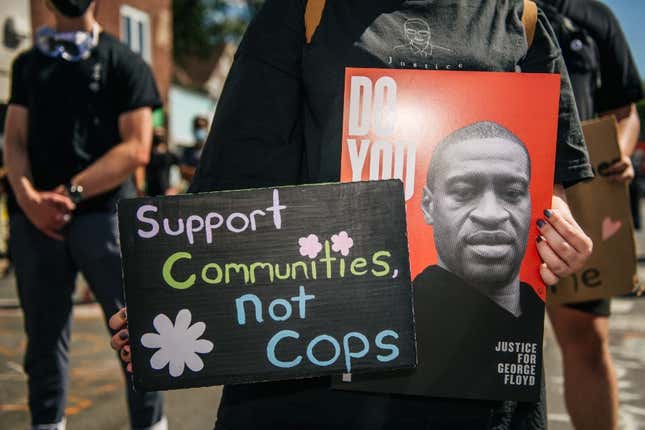
Cops are funny.
One minute they’re swearing to whichever god uses a baton and taser to smite people (Zeus maybe?) that their practices in policing are all above board and beyond reproach. Next thing, you know they’re in court requesting that those very practices be hidden from the public as they unfairly make the officer look like they might be some kind of criminal or something.
Anyway, Derek Chauvin—the former Minneapolis police officer who is charged with second-degree murder after the world watched him kneel on George Floyd’s neck for nearly nine minutes before he died—requested Monday that a judge block prosecutors from introducing evidence of alleged past incidents where he used similar methods of restraint on other suspects.
From the Washington Post:
Prosecutors have said they want to cite eight incidents from Chauvin’s 19-year career as a Minneapolis police officer to show a pattern of excessive force and behavior similar to the Memorial Day encounter that left Floyd dead. Prosecutors want to include four cases from 2014 to 2019 in which they claim Chauvin restrained suspects “beyond the point when such force was needed.”
In a court filing Monday, Eric Nelson, Chauvin’s attorney, asked Hennepin County District Judge Peter A. Cahill, who is overseeing the case, to block that proposed evidence, arguing that his client had used approved force and, after routine investigations, had been essentially “acquitted by MPD supervisors of applying force in a manner that was either unreasonable or unauthorized.”
“The state attempts to characterize Mr. Chauvin’s use of force as ‘unreasonable’ or ‘beyond what was needed,’ ” Nelson wrote, noting that Chauvin had reported his use of force in each of the incidents. “And in every single one, it was determined by a supervisor that Mr. Chauvin’s use of force was reasonable in the circumstances and authorized by law and MPD policy.”
It must be awkward being a defense attorney. Imagine having to look a judge dead in the eyes and, with a straight face, argue: “It’s unfair to characterize my client based on his record of doing the things he’s done because other cops said it was cool at the time.”
Somehow...it gets worse.
According to the Post, one of the cases prosecutors are looking to cite is one where Chauvin applied a neck restraint that caused a suspect to lose consciousness.
Chauvin later told a supervisor that he realized the man had passed out and placed him in a “recovery position” until he “came to,” prosecutors said, something they say the officer did not do when Floyd complained of struggling to breathe.
In his motion to block the incident from being cited at trial, Nelson argued the case is not relevant or similar to Chauvin’s encounter with Floyd and should not be allowed as evidence.
In what appears to be a new defense argument, Nelson repeatedly claimed Chauvin did not use a neck restraint on Floyd but rather what he called “body weight control techniques.”
Body. Weight. Control. Techniques.
Sure, it sounds like a special diet and exercise plan prescribed by Weight Watchers, but it’s actually a thing Nelson, for whatever reason, thinks sounds better than “choked a man to death with his knee.”
Other cases prosecutors want to introduce as evidence include incidents that occurred when Chauvin was off-duty and working as a security guard. Those incidents also involve neck restraints and Nelson’s arguments against their introduction into evidence were the same: The use of force was justified and prosecutors can’t prove he violated department policy.
“[Chauvin’s] modus operandi was simply that of a Minneapolis Police officer performing his duties and reacting to the circumstances,” Nelson wrote. “The state’s attempt to characterize these incidents as evidence of some kind of ill will intent or common scheme of violence that is somehow unique to Chauvin is specious, at best.”
Nelson argued that prosecutors are seeking to violate Minnesota law by using past incidents to “illegally prove propensity.” It’s unclear which law he was citing, but he argued the evidence is not allowed under state law and that it would be “unfairly prejudicial.”
Despite Nelson’s argument that these events shouldn’t be used against his client because they didn’t violate policy, I’m still left with one question: If Chauvin’s own actions make him look so bad that a lawyer needs to ask that prosecutors be barred from mentioning them, how can those same actions also be considered justified?
I’m just saying, cops are funny.

